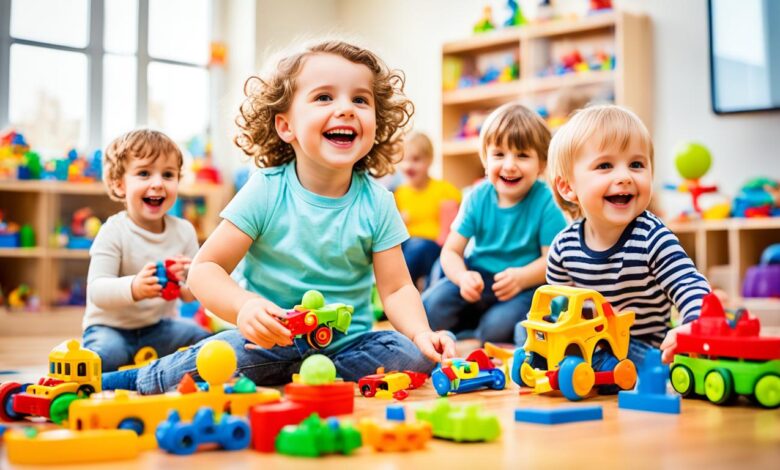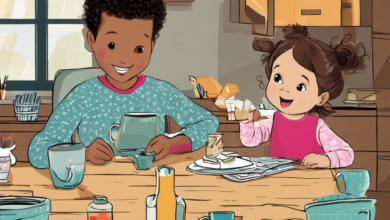
Have you ever seen your child stand in front of a toy box, looking unsure? Play should bring joy, but sometimes it feels lost in the mess. Kids have endless imagination and need the right space to play and be creative. It’s not just about the latest toy; it’s about making playtime meaningful.
We can help our children connect with their toys and boost their creativity by creating a special play area. This space should encourage them to play on their own. It changes how they play and learn.
Children happily engaged with their toys, smiling and playing with enthusiasm in a bright and colorful room filled with various toys of different shapes and sizes. Some children are building structures, while others are playing with dolls or cars. A sense of joy and wonder fills the room as the children explore their toys and express their creativity. The scene is full of movement, with toys scattered all around and children laughing and playing together.
Key Takeaways
- Play is essential for children’s development and learning.
- Creating an organized play space helps children engage more effectively with their toys.
- Choosing the right toys can significantly impact a child’s creative expression.
- Encouraging independent play fosters autonomy and problem-solving skills.
- Understanding your child’s developmental stage helps in selecting appropriate toys.
The Importance of Play for Children
Play is key to a child’s growth, offering chances for exploration and learning. It helps kids gain important skills and knowledge. Through play, they learn to face the world with confidence.
Playing with others boosts creativity and problem-solving skills. This makes play a strong tool for growth.
How Play Affects Development
Children’s play changes as they grow. In the early years, they explore with their senses. This helps them understand their world.
As they get older, play becomes more interactive. It helps with language and social skills, letting them connect with friends. Later, kids enjoy playing on their own, showing they’re growing up and thinking more deeply.
Types of Play at Different Ages
Play changes with age to help kids grow:
- Infants: They enjoy sensory play, touching different textures and hearing sounds.
- Toddlers: They play near others, learning social skills and how to work together.
- Preschoolers: They dive into imaginative play, being creative and telling stories.
- School-age children: They take part in structured play, like team sports and games. This teaches them about working together and strategy.
The Role of Space in Encouraging Play
Creating a welcoming and exciting space can really boost kids’ interest in playing with their toys. A well-designed play area is key for sparking creativity and letting kids play on their own. By setting up a ‘Yes Space,’ caregivers can help kids explore safely and freely.
Creating a ‘Yes Space’
A ‘Yes Space’ lets kids play freely, boosting their imagination. Fill it with toys and materials that make them curious and think more. A safe and welcoming space makes kids feel free to explore and learn without worries.
Tips for Clear Play Areas
It’s important to organize play areas well to help kids explore better. Here are some tips:
- Set aside certain areas just for play.
- Clear out dangers to keep play safe for little ones.
- Use storage to keep toys neat and within reach.
- Make sure there’s room for kids to move around easily.
By focusing on a well-defined play space, caregivers help kids dive deep into their play. This leads to more engagement and creativity.
Choosing the Right Toys for Your Child
Choosing the right toys is key to helping your child grow creatively and intellectually. As they move through different developmental stages, the right toys make learning fun. They also help build important skills for their growth.
Developmentally Appropriate Options
There are many educational toys available for kids at various ages. For example:
| Age Group | Recommended Toys | Developmental Benefits |
|---|---|---|
| Infants (0-12 months) | Soft blocks, rattles | Enhances sensory exploration |
| Toddlers (1-3 years) | Stacking toys, shape sorters | Encourages problem-solving skills |
| Preschool (3-5 years) | Art supplies, building sets | Boosts creativity and fine motor skills |
| School-age (6+ years) | Science kits, puzzles | Fosters critical thinking and teamwork |
Balancing Tools and Entertainment
It’s important to find toys that are both fun and educational. Parents should look for toys that keep kids interested and challenge their minds. Toys that are too simple can get boring quickly.
Changing toys regularly and adding new challenges can make playtime more exciting. This helps keep kids engaged and learning.
A colorful and organized toy shelf with a variety of age-appropriate toys, such as blocks, puzzles, dolls, cars, and art supplies. The toys have clear labels and are displayed in an accessible manner to encourage independent play. The image should convey a sense of fun and playfulness while also emphasizing the importance of choosing toys that support a child’s development.
Promoting Independence in Play
Helping children become independent is key to their growth and confidence. Encouraging them to play alone lets them follow their interests at their pace. This solo time boosts creativity and problem-solving skills without adult help.
Encouraging Solo Playtime
It’s crucial to give kids time to play by themselves. Offering a mix of toys that spark imagination helps them be more independent. Letting them pick what they want to play with is good for them. Toys like building blocks, art supplies, or puzzles make them think and act on their own.
The Benefits of Independent Exploration
Letting kids explore on their own builds resilience. They learn about persistence and adapting when they face challenges. This independence is key to feeling capable. Overcoming obstacles alone makes them trust their skills more.
| Aspect | Benefits of Independent Play | Promoting Autonomy |
|---|---|---|
| Skill Development | Enhances problem-solving and critical thinking | Encourages decision-making and self-reliance |
| Emotional Growth | Builds confidence and self-esteem | Fosters emotional regulation and coping skills |
| Creative Expression | Stimulates imagination through child-led exploration | Allows for personal interpretation and innovation |
Conclusion
Encouraging kids to play is key to their growth and happiness. Parents can help by seeing how vital play is. They should pick toys that are right for their age and make a fun space for play.
Creating a ‘Yes Space’ lets kids explore on their own. This freedom helps them make choices and feel responsible. It makes them more creative and teaches them to love playing.
By focusing on play, parents help kids reach their full potential. Making play a priority creates a world that helps kids grow and keeps them excited about learning and exploring.




